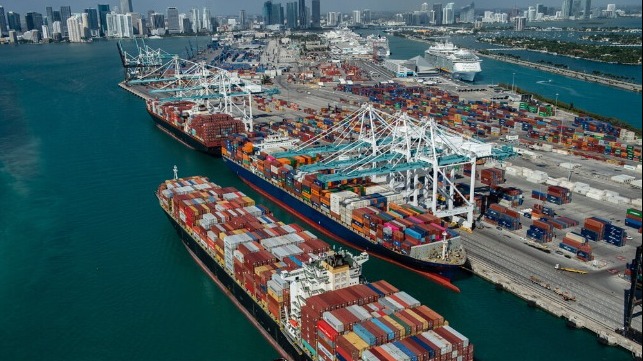Congressmen Propose Refunding Port Fees to Ships Rerouting to the East

The governors of Texas and Florida have both made politically motivated pleas saying their ports are open and available to aid in reducing the backlog at the Southern California ports. Now, as the number of containerships waiting off California reached yet another record high, two members of the U.S. Congress are proposing to pay ships that redirect from Southern California through the Panama Canal to ports on the East Coast and Gulf Coast.
Senator Rick Scott and Congressman Carlos Giménez both from Florida introduced the Supply Chain Emergency Response Act which they said is designed to help alleviate the impacts of “the disastrous supply chain crisis that is affecting families and small businesses across America.” The proposed legislation came after Senator Scott said that he had written to leaders of the port, trucking, and retail industries requesting input on the supply chain challenges they’re facing and what solutions can be implemented to help get goods to America.
“As empty shelves grow more and more common, prices are surging higher and small businesses can’t access the goods they need to serve their customers,” said Senator Scott. He said the Supply Chain Emergency Response Act would get products flowing to American families and businesses. “Fortunately, Florida’s ports are ready and able to help.”
Under the draft legislation, $125 million unspent in the Coronavirus Aid, Relief, and Economic Security Act (CARES) passed in March 2020 would be made available to encourage ships to reroute from California to Florida and other eastern ports. The new legislation would allow state governors to use unspent, obligated CARES Act funding to help offset port fees and other related state-level expenses. There was no mention of the cost the ships would incur sailing the extra distance and the disruptions to schedules and exports by moving ships from Southern California.
The draft legislation calls for setting up the program under the Maritime Administration where shipowners could apply for the funds if they agree to reroute ships from the West Coast to the east and dock in the less crowded ports to offload their containers. However, the proposed legislation contains a provision that “prohibits any individual who is a member of the Chinese Communist Party or any company owned, in whole or in part, by the Chinese Communist Party from being eligible for the provisions under this act.” West Coast ports would also be barred from charging any port fees to ships that skip their reservations and instead proceed to the east to avoid delays.
Last week, Miami-Dade Mayor Daniella Levine Cava said, “We welcome more container ships to our Port, to do our part to help global trade move and grow jobs and business opportunities here in our community. PortMiami is ready!" She appealed for ships while also announcing the PortMiami had seen a 17.6 percent increase in TEUs for the FY ended September 30. It was the busiest year in cargo activity in the Port's history the mayor said with a total of 1,254,064 TEU handled at the port.
“Florida’s ports have clamored for more cargo vessels to reroute from their original port call to California and come to the East,” said Representative Giménez. “Like Florida, several states in the Gulf and the eastern seaboard have both the port capacity and the logistical capabilities to ensure goods reach our shelves in a timely and efficient manner.”
This latest proposal to address the backlog of ships comes as the Marine Exchange of Southern California reported that yet more records have been set due to the backlog. On November 9, there were a record 111 containerships either at the terminals or waiting to enter the ports of Los Angeles and Long Beach, exceeding the previous record by three ships. This included a record of 81 containerships waiting with a third record of 49 of those ships beyond the anchorage waiting for space. An additional 16 containerships were also inbound due to arrive in the area between today and Friday.
